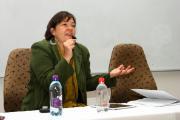
Dr Catherine Burns of the University of the Witwatersrand Institute for Social and Economic Research (WISER), was candid and heartfelt in her lecture, when addressing an audience of mainly Rhodes students about their civic responsibility and intellectual autonomy.
“Digging down into the second transition” the title of her lecture, on the third day of the Annual Teach-In series, drew from her own observations and experiences as well as examining the ideas of Nelson Mandela, Moletsi Mbeki and others.
Dr Burns likens this outlook as “having the wit and intelligence to dig down, to grow rhizomes, which creates courage”.
Using the concept of creating “new mental elite” she urged the audience to “denaturalise” in the same way that the Constitution was a transformation, representing all the key values of intellectual and social progress.
Speaking about the ANC “second transition”, Dr Burns says, preceding the ANC’s recent policy conference, 11 crucial documents, of varying lengths, were made available to the public on the ANC’s website. Hard copies were also made available so that ANC members all over the country could discuss the various issues laid out and debate their concerns at the conference.
“But the reality was very different,” says Dr Burns as, according to the search engines, fewer than a third of the delegates (each who had supposedly been ‘voted in’ to attend) had actually read the documents.
With this in mind she says: “What people wrote and said [in the public sphere] got you closer to what was really going on at the conference.”
She noted “a huge divide between the public and the private domain, an assertion of control of the judiciary and a heavy-handed, Stalinist style of language around concepts such as ‘momentousness’ and ‘era-change.’”
She says Deputy President Kgalema Motlanthe recently questioned this type of “old-style Leninist discussion” for which he was criticised by fellow ANC members.
Dr Burns was adamant that the public and private spheres are not separated in terms of political discourse, accusing some tertiary institutions and political scholars of ignoring how “the two are connected by an umbilical cord - with the misguided notion that ‘the private life is not politics.’
She admires thinkers like Moeletsi Mbeki, who visited Wits in May to present a talk entitled “What has the ANC achieved in 13 years of liberation?”
“He engaged his listeners on subjects such as economics and philosophy supposedly what young people aren’t interested in even discussing the positive legacy of the likes of Cecil John Rhodes and Jan Smuts among others.
“He compared South Africa’s future by being bound up in the playing of many chords not just a single note.”
In line with this, Dr Burns urges South Africans to refrain from comparing us with western countries. Instead we should be looking to Brazil, India and China to see how they solve their economic and agricultural problems.
“Brazil in particular has a small percentage of wealthy citizens and the majority of the poor but they have brought this number down,” she said. As Nelson Mandela said: “Freedom is not divisible you are either free or not free.”
In conclusion she repeated Wits spokesperson Shirona Hassiem’s recent words: “We can’t call the period we live in the second transition if we haven’t even achieved the values of the first.”
The purpose of the Annual Teach-In is to consider an issue of public and interrogate public issues.
These lectures bring a particular issue of interest and concern in the public sphere to the attention of the University and the wider community.
Professor Steven Friedman will deliver today’s lecture entitled: “The Fault Lies Not in Our Transition But in Ourselves: The Second Transition and the Deflection of Responsibility”.
Teach-In lectures continue at Barratt Lecture Theatre until tomorrow from 1pm – 2pm.
For more information about the Teach-In lectures visit: www.ru.ac.za/politicalinternationalstudies/teach-in
By Anna-Karien Otto
Photo by Ross Shackleton.
